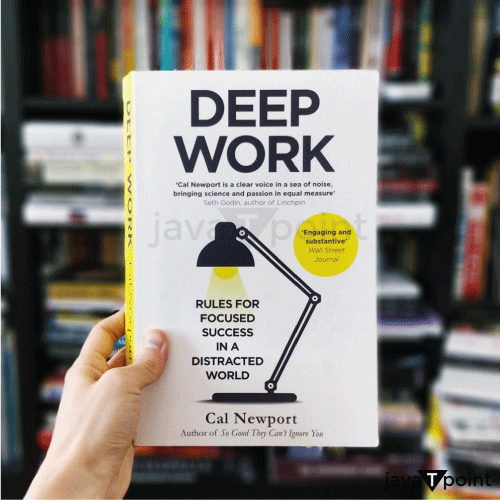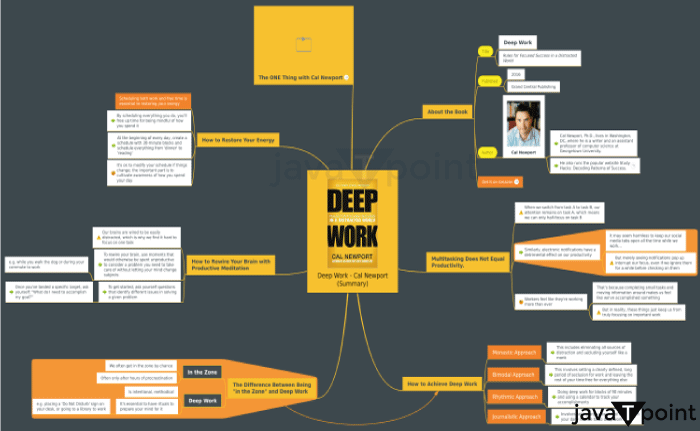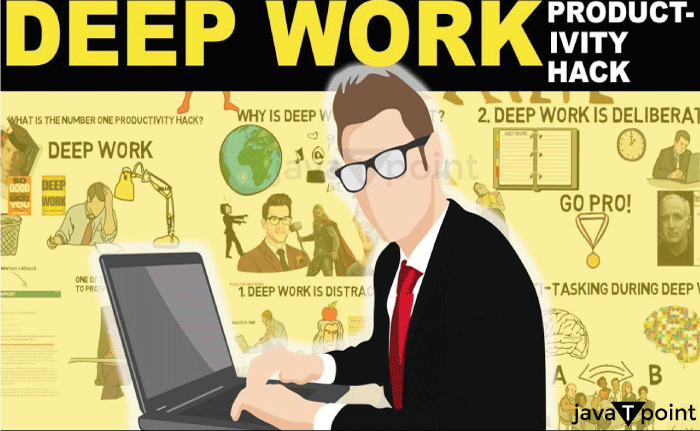Deep Work Summary
A Three-Sentence Summary of the Book

- Deep work is the capacity to pay attention to a cognitively challenging activity without distraction.
- Shallow work is routine, non-cognitively challenging labor frequently done while multitasking.
- Deep work is comparable to a superpower in our 21st-century economy, which is becoming increasingly competitive.
The Big Five Concepts

- You need to dedicate yourself to intense labor if you want to produce the most excellent work you are capable of.
- Being successful in today's market requires two essential skills: the ability to swiftly learn challenging concepts and the capacity to create at an elite level in terms of both quality and speed.
- "You need to concentrate intently and without interruption to learn difficult things quickly."
- "Your work is a craft, and if you refine your ability and apply it with respect and care, then like the skilled wheelwright, you can generate meaning in the daily efforts of your professional life," the author writes.
- "The secret to forming a deep work habit is to go beyond good intentions and incorporate rituals and routines into your working life that are intended to reduce the amount of your limited willpower required to enter & sustain an unbroken state of concentration."
Summary of the Deep Work

- Deep Work: Professional tasks are carried out under undistracted attention that strains your cognitive powers. These initiatives add fresh value, boost your competence, and are challenging to duplicate.
- Shallow Work: Logistical-style jobs that are not cognitively demanding and are frequently done while distracted. These initiatives are simple to reproduce and usually provide little new value to the world.
- According to Newport, spending enough time in a frenetic shallowness permanently diminishes your ability to accomplish profound work.
- Deep work is not some cynical conceit of authors and philosophers from the early 20th century. Instead, it's a talent that is extremely valuable right now.
- You need to dedicate yourself to serious effort if you want to produce the most incredible work possible.
- Deep work is referred to as "the superpower of the 21st century" by Cal Newport.
- The Hypothesis for Deep Work: Deep job skills are getting more challenging to come by simultaneously as they are gaining value in our market-the few who master this talent and make it the center of their professional lives will prosper.
Newport Himself Says,

- I organize my days around a core of thoughtfully selected backbreaking work, with the shallow things I can't help but engage in batch-scheduled into shorter phases at the edges of my agenda. Unbroken and properly focused concentration for three to four hours a day, five days a week, can result in significant helpful work.
- Two essential skills for prospering in today's market are the ability to swiftly understand complex concepts and the capacity to create at an elite level in terms of quality and speed.
- "The disparities between expert performers and average adults reflect a lifetime of a conscious effort to improve performance in a particular domain."
- The following are typically recognized as the central elements of purposeful practice: (1) You have your full attention on a single ability you want to improve or concept you want to master; (2) You get input to adjust your strategy and maintain your focus where it's most valuable.
- "According to this new science of performance, you improve at a skill as more myelin forms around the relevant neurons, enabling the appropriate circuit to fire more fluidly and successfully. To be outstanding at something, you must be properly myelinated."
- "By concentrating intently on a particular talent, you're repeatedly pressuring the particular relevant circuit to fire in isolation. This repeated usage of a particular circuit causes cells called oligodendrocytes to start encircling the neurons in the circuits with layers of myelin, essentially solidifying the ability.
- "You must focus intently without interruption to learn difficult things quickly."
- "When you go from one activity A to another Task B, your attention doesn't follow instantaneously; a portion of it is left behind and is trapped on the first activity. Even if you accomplish Task A before moving on, your attention will be split. This residue becomes thicker if your work on Task A was unbounded and of low intensity before you switched.
- "People experiencing attention residue after switching tasks are likely to demonstrate poor performance on that next task," says Sophie Leroy, "and the more intense the residue, the worse the performance."
- "To perform at your best, you must work long stretches while maintaining complete focus on a task free from distractions."
- The least-resistance principle: Without clear input on how different behaviors affect the bottom line in a professional situation, we are more likely to choose the most convenient actions.
- It is said that "clarity about what matters provides clarity about what does not."
- Lack of clear signs of what it means to be productive and essential in one's work leads many knowledge workers to revert to an industrial indicator of productivity: noticeably doing many things. This is known as "busyness as a proxy for productivity."
- Deep work suffers significantly in a technopoly because it is based on distinctly antiquated and non-technological ideals, such as quality, craftsmanship, and mastery.
- Human beings function best when intensely engaged in a difficult task.
- "A proven path to deep satisfaction is to build your working life around the experience of flow produced by deep work."
- Your job is a craft, and if you refine your talent and use it with respect and care, then, like the skillful wheelwright, you may find significance in the day-to-day activities of your professional life.
- Willpower has a limited supply and is used up over time.
- The secret to creating deep work habits is to go beyond having excellent intentions and incorporate rituals and routines into your working day that will help you use as little of your meager willpower as possible to enter and stay in a state of uninterrupted concentration.
- You must have your philosophy to include meaningful work in your working life.
- You must be cautious about selecting a philosophy corresponding to your unique situation since a mismatch here might prevent your deep work habit from developing.
- "[Donald] Knuth employs what I refer to as the monastic philosophy of deep work scheduling." This way of thinking reduces or eliminates shallow commitments to maximize deep efforts drastically.
- "[Carl] Jung's method is what I refer to as the bimodal deep work philosophy. It suggests splitting your time into clearly defined periods of severe endeavors and leaving the remainder open to everything else.
- According to the rhythmic philosophy, the best method to regularly begin severe work periods is to make them a routine, easy habit.
- Regarding Walter Isaacson, John Paul Newport "It was always incredible... He could spend some time working on his book in the bedroom while we were relaxing on the patio or doing something else. We could hear the typewriter hammering while he was up there for 20 to an hour, but when he came down, he was just as calm as the rest of us. He simply cheerfully walked up to work when he had the time, the labor never seeming to phase him.
- The approach taken by journalists is to plan in-depth work whenever you can.
- "To get the most out of your deep work sessions, develop rituals with the same rigidity and eccentricity as the significant thinkers previously mentioned."
- "A specific location for your deep work efforts needs to be specified in your ritual."
- Regardless of where you work, set a deadline for yourself so that the session remains a focused task rather than an endless slog.
- "Your ritual needs guidelines and procedures to maintain order in your activities."
- "By leveraging a radical change to your everyday environment, possibly accompanied by a sizeable outlay of time or resources, all committed to supporting a deep work task, you increase the perceived importance of the task," says Dr. Peterson.
- "Peter Shankman reserved a round-trip business-class ticket to Tokyo. He worked throughout his journey to Japan, enjoyed an espresso in the business class lounge once he got there, and then turned around and traveled back, working throughout the flight. He returned to the United States barely thirty hours after leaving initially with a finished novel in hand.
The 4DX: The Four Disciplines of Execution

These guidelines for deep work include the following:
- Ensure that you pay attention to what is very important.
- Implement the lead measures.
- Maintain an Attractive Scoreboard
- Make an Accountability Cadence
- The implication is that you should choose a limited number of ambitious goals to work on during your deep work hours if you're a person who is focused on deep work.
- According to David Brooks, if you want to win the war for people's attention, try saying "yes" to the issue that makes them feel a terrible need rather than rejecting the trifling diversions they may discover on the information smorgasbord. This will make them ignore everything else.
- Both lag measurements and lead measures are available in 4DX for this purpose.
- The item you're ultimately aiming to enhance is described by lag measurements.
- "Lead measures, on the other hand,'measure the new behaviors that will drive success on the lag measures.'"
- Lead actions concentrate your focus toward enhancing the behaviors you directly control in the immediate future, which will subsequently have a beneficial influence on your long-term goals.
- "At the conclusion of the workday, stop thinking about work-related matters until the following morning. Don't check your email after supper, repeat conversations in your head, or plan how you'll approach a difficulty.
1. Reason No. 1
Downtime Aids Insights
2. Reason No. 2
Downtime Aids in Recharging the Energy Required for Deeply
Work
3. 3rd Reason:
Usually, the work that evening downtime replaces is not very important.
- Deep work training must have two objectives: enhancing your capacity for deep concentration and suppressing your desire for distraction.
- "Make a plan for when you'll use the Internet, and avoid it entirely outside of these times."
- Identify the key elements that influence success and pleasure in both your business and personal lives using the craftsman approach to tool selection.
- Adopt a tool only if its advantages over these factors vastly exceed its disadvantages.
- To start using the Craftsman Approach to Tool Selection, you must first determine your principal, long-term objectives in your personal as well as professional life.
- The secret is to keep the list focused on the most crucial items and to keep the explanations appropriately high-level.
- "When you're finished, you should have a manageable number of objectives for both your personal and professional life."
- "Once you've determined these goals, name the top two or three actions that will enable you to achieve each one. These actions must be detailed enough for you to visualize yourself carrying them out. On the other hand, they need to be sufficiently generic to not be dependent on a particular result.
- The last phase in this strategy is to think about the network tools you already use. Ask yourself if using each of these tools will significantly improve, significantly worsen, or hardly affect your frequent and effective involvement in each of the main activities you've selected. Now comes the crucial choice: Continue using this instrument only if you've determined that its good effects are significant and exceed its drawbacks.
- "Ask yourself the following two questions regarding each of the services you temporarily stopped using after 30 days of your self-imposed network isolation: Would I have been able to employ this service, would the past thirty days have been noticeably better? Did anyone notice that I didn't use this service?
- "Stop using the service permanently if your response to both questions is "no. If the answer was an unequivocal "yes," continue utilizing the service.
- "The shallow work that increasingly consumes knowledge workers' time and attention is less important than it often appears in the moment."
- How long can someone continue serious work in a single day?
- "[Anders Erickson] notes that an hour a day is an acceptable cap for someone new to such practice, highlighting,in particular a youngster who is just beginning to develop an expert-level talent. The maximum increases to around four hours for individuals who are accustomed to the hardships of such exercises, but rarely more.
- "We operate largely on autopilot throughout the day, not giving much thought to how we spend our time."
https://www.samuelthomasdavies.com/book-summaries/business/deep-work/
|





 For Videos Join Our Youtube Channel: Join Now
For Videos Join Our Youtube Channel: Join Now









